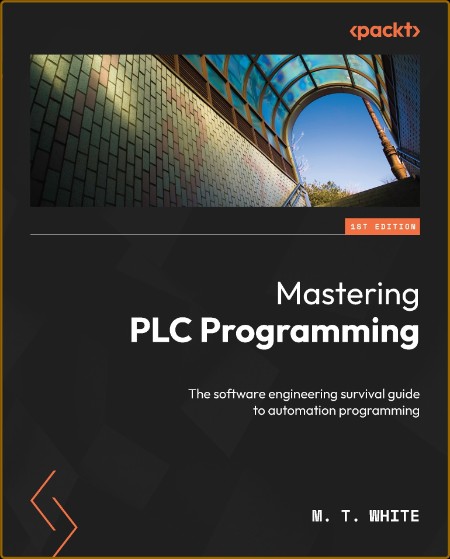
pdf | 10.49 MB | English | Isbn: B0BQWF4P8Z | Author: M. T. White | Year: 2023
Description:
Learn PLC programming from the software perspective to understand advanced concepts such as OOP and HMI development and design reusable, portable, and robust code
Purchase of the print or Kindle book includes a free PDF eBookKey Features
[*] Take a deep dive into object-oriented PLC programming to gain hands-on knowledge
[*] Explore software engineering concepts such as SDLC, debugging, and SOLID programming
[*] Get a thorough grasp on HMI development to build various HMI projectsBook Description
Object-oriented programming (OOP) is a new feature of PLC programming that has taken the automation world by storm. This book provides you with the necessary skills to succeed in the modern automation programming environment.
The book is designed in a way to take you through advanced topics such as OOP design, SOLID programming, the software development lifecycle (SDLC), library design, HMI development, general software engineering practices, and more. To hone your programming skills, each chapter has a simulated real-world project that'll enable you to apply the skills you've learned. In all, this book not only covers complex PLC programming topics, but it also removes the financial barrier that comes with most books as all examples utilize free software. This means that to follow along, you DO NOT need to purchase any PLC hardware or software.
By the end of this PLC book, you will have what it takes to create long-lasting codebases for any modern automation project.What you will learn
[*] Find out how to write PLC programs using advanced programming techniques
[*] Explore OOP concepts for PLC programming
[*] Delve into software engineering topics such as libraries and SOLID programming
[*] Explore HMIs, HMI controls, HMI layouts, and alarms
[*] Create an HMI project and attach it to a PLC in CODESYS
[*] Gain hands-on experience by building simulated PLC and HMI projectsWho this book is for
This book is for automaton programmers with a background in software engineering topics such as object-oriented programming and general software engineering knowledge. Automation engineers, software engineers, electrical engineers, PLC technicians, hobbyists, and upper-level university students with an interest in automation or robotics will also find this book useful and interesting. Anyone with a basic knowledge of PLCs can benefit from reading this book.Table of Contents
[*] Software Engineering for PLCs
[*] Advanced Structured Text - Programming a PLC in Easy-to-Read English
[*] Debugging - Making Your Code Work
[*] Complex Variable Declaration - Using Variables to Their Fullest
[*] Functions - Making Code Modular and Maintainable
[*] OOP - Reducing, Reusing, and Recycling Code
[*] OOP - The Power of Objects
[*] Libraries - Write Once, Use Anywhere
[*] The SDLC - Navigating the SDLC to Create Great Code
[*] Advanced Coding - Using SOLID to Make Solid Code
[*] HMIs - UIs for PLCs
[*] Industrial Controls - User Inputs and Outputs
[*] Layouts - Making HMIs User-Friendly
[*] Alarms - Avoiding Catastrophic Issues with Alarms
[*] Putting It All Together - The Final Project
[*] Distributed Control Systems, PLCs, and Networking
Category:Industrial Technology, Automation Engineering, Industrial Technology


